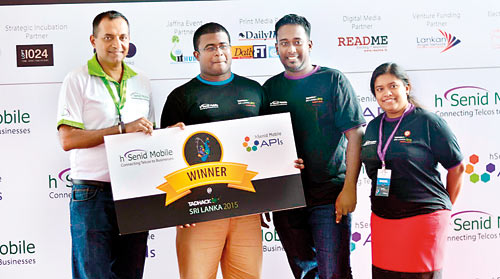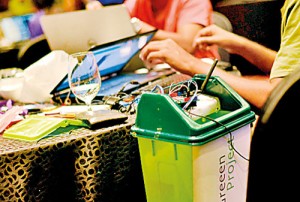IoT apps, Tuk Tuks take centre -stage at local TADHack
While smart home apps, supported by IoT (Internet of Things) functionality, and to a lesser degree Tuk Tuk (trishaw)-related apps appeared to be the standard fare at this year’s TADHack telecom application development hackathon, it was ultimately a car park mobile payments system that took home the big money, US$ 1,000, at this recently concluded competition.

Winners
The aptly named Car Park M-Pay system is a location-based app that can be used by private homeowners to let nearby drivers know that they have car park facilities available, while also accepting payment for the use of this parking space via mobile cash.
Organised by hSenid Mobile Solutions, this TADHack held in Colombo last week, was the local leg of the international event, where the winner from Sri Lanka joined international teams in competition for a US$ 36,000 ultimate prize.
But most important of all, it was the uniqueness of some of the applications being presented that truly deserve the attention of Sri Lanka’s tech community. Comprising over 20 teams, and encompassing 24-hour hackathons in both Colombo and Jaffna, the ultimately showcased apps featured ideas for cooking, home security, clothes drying, etc. Interestingly, this year’s contest also featured the first-ever entry by a local corporate, Orange Electric, wherein a robotic arm was enabled through a “cellular M2M BOX”, to pick up and hand over objects on shelves. Search YouTube using this company’s name and the term “robotic arm” for a demonstration of this idea.
The runners-up at this competition were also quite innovative, namely an UBER-type delivery service, e-Carry, where nearby trishaws, vans, cars, bikes, etc could be tapped to freelance as a delivery service if potential customers want to get something dropped off. And the Green project, an

Innovating
interactive eco-initiative where an enclosed sensor in a recycling only dustbin calls for a pick-up by the service provider once it registers as being full.
Another of the abovementioned unique concepts demoed at TADHack 2015 was the i-Clothesline (i-CL), which consisted of a mix of hardware and software, which facilitated clothes being dried being covered up when a sensor attached to the device encountered raindrops. This idea was not only targetted at everyday consumers, but also for large-scale apparel manufacturers, etc.
Additionally highlighted innovations included: a voice commanded smart app for light bulbs, or similar devices, that could also be extended to encompass motion sensors and CCTV security cameras; a low cost home security app that took pictures of intruders rather than using CCTV; apps offering to find nearby day labourers and/or plumbers/electricians/etc. where USSD functionality is used because lower income groups may lack of access to smart phones; and even an app tied into sensors at the base stations of utility providers like the CEB or the Water Board, which can in turn notify engineers of an outage while also instantaneously sending an automated message to affected residents, updating them about the relevant service.


